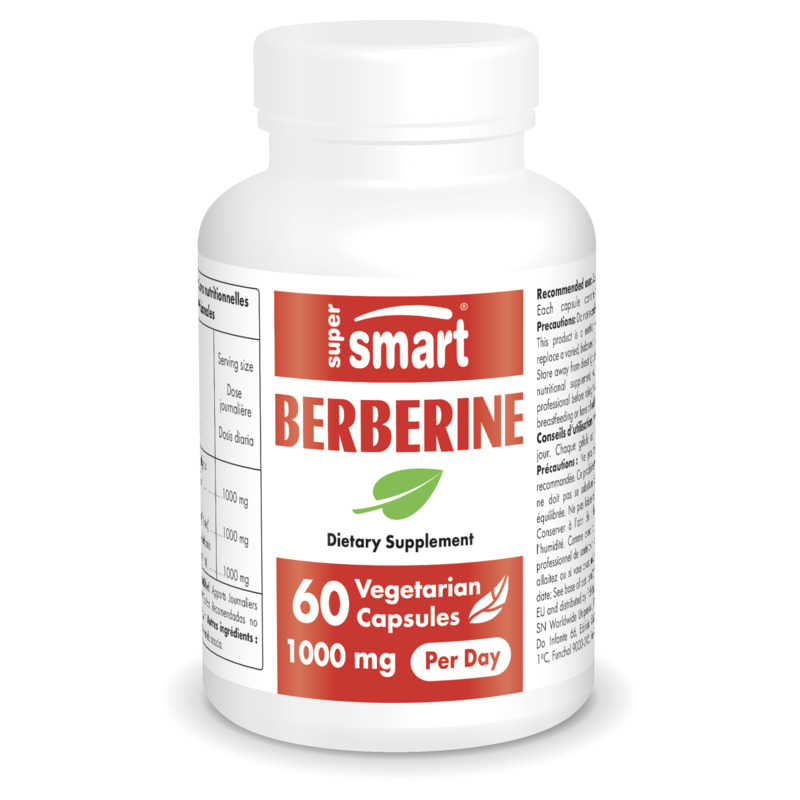In recent years, there has been a growing interest in natural supplements for enhancing health and wellness. Among these, berberine stands out as a noteworthy contender.
Derived from various plants like barberry, goldenseal, and Oregon grape, berberine has been used in traditional medicine for centuries.
It is renowned for its range of health benefits, including supporting heart health and managing cholesterol levels. As we delve deeper into its advantages, it’s clear why berberine is capturing attention in the wellness community.
Contents
Berberine and Heart Health
Berberine plays a pivotal role in supporting heart health by positively influencing several cardiovascular risk factors. It effectively regulates cholesterol levels by decreasing total cholesterol, LDL (bad) cholesterol, and triglycerides, while boosting HDL (good) cholesterol. This regulation is crucial as these factors are tightly linked to heart disease risk.
Scientific studies highlight berberine’s promising cardiovascular benefits. Research indicates that berberine reduces apolipoprotein B levels, a key marker for heart disease risk, by 13–15%. Additionally, studies have demonstrated its efficacy in managing arrhythmias, paralleling the effects of amiodarone without adverse outcomes. Berberine’s impact on atherosclerosis is significant; it lowers inflammatory markers like TNF-α and IL-6, and enhances endothelial function.
Moreover, by inhibiting the PCSK9 enzyme, berberine improves cholesterol levels, making it a valuable ally in heart health. While these findings are encouraging, further research is necessary to fully understand berberine’s clinical applications and long-term effects on cardiovascular health. This natural compound holds potential as a heart health supplement, offering a holistic approach to wellness.
Managing Cholesterol Levels
Berberine has emerged as a promising natural supplement for managing cholesterol levels. It effectively reduces LDL cholesterol by upregulating LDL receptors on liver cells and inhibiting the enzyme PCSK9. This dual action facilitates the removal of more LDL from the bloodstream, significantly lowering its levels. Clinical trials have demonstrated reductions in LDL by approximately 20 to 50 mg/dL, alongside decreases in triglycerides by 25 to 55 mg/dL.
When compared to traditional treatments like statins, berberine offers a comparable and sometimes preferable alternative. Statins are well-known for their cholesterol-lowering effects but may not be well-tolerated by all patients. Berberine can serve as an alternative for those who are intolerant or resistant to statins.
Notably, studies have shown that berberine can decrease total cholesterol from 205 mg/dL to 168 mg/dL, mirroring the efficacy of statins.
While berberine’s benefits in cholesterol management are promising, it is crucial to consult healthcare providers to ensure its appropriate use and to discuss potential interactions with medications.
Mechanism of Action
Berberine works its magic at a molecular level by influencing several biological pathways, playing a crucial role in both heart health and cholesterol management. One significant pathway is the AMPK/mTOR pathway. By activating AMPK, berberine helps regulate energy homeostasis and enhances lipid metabolism. This activation leads to improved insulin sensitivity, which is vital for metabolic health.
Another vital pathway is the SIRT1/FOXO1/SREBP2 pathway, where berberine impacts glucose and lipid metabolism. These interactions help manage cholesterol and overall metabolic functions. Additionally, berberine’s activation of the Nrf2/HO-1 pathway provides antioxidant benefits, reducing oxidative stress and inflammation.
When it comes to lipid metabolism, berberine targets key proteins like CD36 and LDLR, modulating lipid production and clearance in the liver. It also maintains vascular function by affecting proteins crucial to heart health. Furthermore, berberine influences gut microbiota, which plays a role in lipid synthesis and metabolism, offering a multi-organ impact on lipid regulation.
These intricate interactions highlight berberine’s potential as a therapeutic agent in managing heart health and cholesterol levels.
Recommended Dosage
Finding the right dosage of berberine is essential to maximize its heart health benefits and support cholesterol management. Generally, a daily dose of 500 mg to 1500 mg, divided into two or three doses, is recommended for adults. This range is considered effective for most individuals in improving heart function and managing lipid levels.
However, variations may occur based on age, weight, and health conditions. Older adults or those with underlying health issues might require adjustments. It’s crucial to start with a lower dose and gradually increase to monitor the body’s response. People with liver or kidney issues should consult their healthcare provider before starting berberine.
As with any supplement, individual needs can vary, and it’s always wise to seek personalized advice from a healthcare professional to ensure optimal benefits while minimizing potential risks.
Potential Side Effects
While demonstrating promising benefits for heart health and cholesterol management, it’s important to be aware of potential side effects. Commonly reported mild side effects include digestive issues such as upset stomach, nausea, and constipation. Some individuals might also experience skin reactions like rash or headaches.
Regarding long-term safety, concerns arise due to limited research. Berberine may interact with medications like metformin, potentially affecting blood sugar management.
Additionally, its safety during pregnancy and breastfeeding is uncertain, with potential risks to the fetus or newborn. Animal studies have highlighted more severe side effects, emphasizing the need for cautious use.
Considering these factors, consulting a healthcare provider before starting berberine is essential, especially for those with pre-existing conditions or on medication.
Who Should Avoid Berberine
While berberine is lauded for its heart health benefits, certain groups should exercise caution. Pregnant and breastfeeding women are advised against using berberine due to potential risks to the fetus and newborns. Additionally, children and newborns should avoid it, as safety in these age groups isn’t established.
Potential interactions with medications are also a concern. Berberine can alter the effectiveness of drugs like metformin, blood thinners, and cholesterol medications, due to its impact on liver enzymes. This could lead to increased medication levels in the bloodstream and serious side effects.
Those taking prescription medications should consult their healthcare provider to prevent any adverse interactions when considering berberine for heart health or cholesterol management.
Comparison with Other Supplements
When it comes to heart health supplements, berberine offers unique advantages that set it apart from others like fish oil, niacin, and red yeast rice. Below is a comparison table highlighting how berberine stacks up against these supplements:
| Supplement | Main Benefits | Unique Features |
| Berberine | Improves cholesterol, aids in weight loss, regulates blood sugar | Inhibits PCSK9 enzyme, offering a comprehensive lipid profile improvement |
| Fish Oil | Lowers triglycerides, reduces blood pressure | Rich in omega-3 fatty acids beneficial for heart health |
| Niacin | Lowers LDL and triglycerides, increases HDL | FDA approved for hyperlipidemia |
| Red Yeast Rice (RYR) | Lowers LDL cholesterol and triglycerides | Contains statin-like monacolins |
What makes berberine truly stand out is its multifaceted approach. It not only supports heart health by improving cholesterol levels but also addresses weight management and blood sugar regulation. Its potent antioxidant and anti-inflammatory properties further enhance its heart health benefits. With its excellent safety profile, berberine presents a compelling choice for those looking to enhance their cardiovascular health.
Combining Berberine with Other Treatments
Berberine’s integration with conventional medications can amplify its benefits for heart health. When used alongside medications for cholesterol or blood sugar control, berberine may offer synergistic effects. For instance, it works by inhibiting the PCSK9 enzyme, enhancing the removal of LDL cholesterol from the bloodstream.
This unique mechanism can complement the action of statins, potentially leading to better lipid profile management.
Beyond medications, berberine can be a powerful ally in a lifestyle overhaul aimed at heart health. Incorporating dietary changes such as increasing fiber intake and adopting a Mediterranean diet can further support cholesterol management. Regular physical activity, like brisk walking or cycling, can enhance berberine’s effects on weight loss and blood sugar regulation.
While berberine offers a multifaceted approach to heart health, it should not replace prescribed treatments. Instead, it can be part of a comprehensive plan that includes medication, diet, and exercise. Consult with healthcare providers to tailor this combination effectively, ensuring maximum benefits and safety.
Products
| Amazon related products |
| Ebay Products |
Berberine Max Bioactivity | 60 Veg. Caps – SuperSmart |
Berberine 120 Veg Caps by Source Naturals |
Sources
-
Efficacy and Safety of Berberine Alone for Several Metabolic Disorders
Meta-analysis confirms berberine improves lipid profiles, insulin resistance, and blood glucose control—supporting its use in metabolic disorders like type 2 diabetes and obesity. -
Berberine in the Metabolic Syndrome: The Risk for Cardiovascular Disease
Berberine shows promise in preventing cardiovascular complications by lowering glucose and lipids, reducing inflammation, and enhancing insulin sensitivity. -
Berberine Is Comparable to Metformin in Type 2 Diabetes: A Pilot Study
In this clinical trial, berberine reduced HbA1c and improved lipid profiles as effectively as metformin in newly diagnosed type 2 diabetes patients. -
Berberine’s Role as an Antidiabetic Compound: Mechanisms and Potential
Review of glucose-lowering effects via AMPK activation, improved insulin signaling, and anti-inflammatory properties in diabetes management. -
Berberine for Non-Alcoholic Fatty Liver Disease (NAFLD): Meta-Analysis Results
Evidence suggests berberine improves liver enzymes, insulin sensitivity, and lipid levels, supporting its potential as an adjunct treatment for NAFLD. -
Berberine and Weight Loss: NCCIH Fact Sheet
Summarizes clinical findings on berberine’s role in weight loss and highlights safety concerns, including potential drug interactions and GI side effects.
Conclusion
Berberine stands out as a multifaceted supplement that supports heart health by regulating cholesterol levels, controlling blood sugar, and aiding in weight management.
Its anti-inflammatory properties further bolster its heart health benefits. Despite its impressive profile, it’s crucial to consult with healthcare providers before incorporating berberine into your regimen.
They can provide personalized advice, ensuring it complements your existing treatments and health goals. Remember, professional guidance is key to safely reaping the full benefits of this powerful supplement.


